
Surveillance & Society
Scope & Guideline
Connecting scholars and practitioners in the realm of surveillance studies.
Introduction
Aims and Scopes
- Critical Examination of Surveillance Technologies:
The journal focuses on the implications of various surveillance technologies, including AI, digital monitoring, and data analytics, and how they influence societal norms and individual behaviors. - Interdisciplinary Approaches to Surveillance Studies:
Surveillance & Society promotes interdisciplinary research that draws from sociology, political science, law, media studies, and cultural studies to analyze the complexities of surveillance. - Impact of Surveillance on Marginalized Communities:
A key area of focus is the exploration of how surveillance disproportionately affects marginalized groups, including discussions on race, gender, and socio-economic status. - Surveillance and Governance:
The journal investigates the relationship between surveillance practices and governance, particularly in terms of state power, policing, and public policy. - Cultural Representations of Surveillance:
There is a strong emphasis on cultural analysis, including how surveillance is represented in literature, film, and other media, providing insights into societal attitudes and anxieties about surveillance.
Trending and Emerging
- AI and Surveillance Integration:
There is a notable increase in research exploring the integration of artificial intelligence in surveillance practices, addressing concerns about algorithmic bias, predictive policing, and the ethical implications of AI-driven monitoring. - Surveillance in Crisis Situations:
Recent papers emphasize surveillance's role in crisis contexts, such as public health emergencies and political unrest, highlighting the rapid deployment of surveillance technologies during the COVID-19 pandemic. - Cultural and Creative Responses to Surveillance:
Emerging themes include artistic and cultural critiques of surveillance, showcasing how creative practices engage with and challenge surveillance norms and technologies. - Surveillance and Environmental Governance:
The intersection of surveillance with environmental issues, particularly in the context of climate change and resource management, is gaining traction, reflecting a growing awareness of surveillance's role in ecological governance. - Data Justice and Equity:
Research focused on data justice and equitable approaches to surveillance practices has increased, emphasizing the importance of addressing power imbalances and advocating for marginalized voices in surveillance discourse.
Declining or Waning
- Traditional Policing and Surveillance Practices:
Research specifically centered on conventional policing methods and their surveillance implications has waned, possibly overshadowed by more contemporary discussions on digital surveillance and algorithmic governance. - Surveillance in Pre-Internet Contexts:
There appears to be less emphasis on historical perspectives of surveillance that predate the digital age, as the journal increasingly focuses on the implications of modern technologies. - Surveillance Theories of the Past:
Older theoretical frameworks of surveillance, such as Foucauldian analyses, are less frequently referenced, suggesting a shift towards newer theoretical paradigms that engage with contemporary issues. - Political Surveillance in Stable Democracies:
Discussions on political surveillance in stable democratic countries have decreased, perhaps due to a growing concern with authoritarian regimes and the global rise of surveillance states. - Privacy as a Standalone Topic:
The discourse surrounding privacy rights as a distinct topic has diminished, as the journal integrates privacy considerations more holistically within broader discussions on surveillance.
Similar Journals

Tecnoscienza-Italian Journal of Science & Technology Studies
Advancing Understanding in Science and Technology Studies.Tecnoscienza - Italian Journal of Science & Technology Studies is an esteemed open-access journal published by TECNOSCIENZA since 2010, dedicated to the interdisciplinary field of science and technology studies. With a focus on the sociocultural implications of scientific advancements, the journal serves as a crucial platform for researchers, professionals, and students alike to engage with contemporary issues at the intersection of technology and society. The journal is indexed with an increasing presence in recognized databases, achieving a commendable ranking across several categories in Scopus for the year 2023, including Q3 in Communication and Social Sciences (miscellaneous). Although it primarily engages with themes in sociology and political science, it invites submissions that explore the broader implications of technology in various sectors. By facilitating open access to its content, Tecnoscienza aims to contribute significantly to the ongoing discourse on the role of science and technology in shaping societal frameworks, making it an invaluable resource for those invested in understanding these dynamic fields.
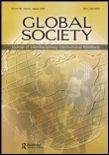
Global Society
Fostering Interdisciplinary Dialogue on Planetary ChangeGlobal Society, published by Routledge Journals, Taylor & Francis Ltd, serves as a vital platform for interdisciplinary research in the fields of Geography, Planning and Development, and Global and Planetary Change. With an ISSN of 1360-0826 and an E-ISSN of 1469-798X, this esteemed journal has maintained a Q2 ranking in Geography, Planning and Development and a Q3 ranking in Global and Planetary Change as of 2023, highlighting its significant contribution to contemporary academic discourse. The journal, operational since 1996 and converging through 2024, aims to foster engagement and dialogue among researchers, professionals, and students on pressing global issues, making it an essential resource for anyone looking to deepen their understanding of societal dynamics and environmental challenges. Although it currently does not offer Open Access options, its robust rank in Scopus underlines its scholarly integrity and relevance in the ever-evolving landscape of global studies.
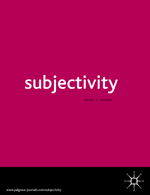
Subjectivity
Pioneering the Study of Subjective Factors in PsychologySubjectivity is a prominent journal under the esteemed Palgrave Macmillan Ltd, focusing on the intricate realms of Applied Psychology and Social Psychology. With an ISSN of 1755-6341 and an E-ISSN of 1755-635X, this journal provides a platform for rigorous research and insights into the subjective experiences that shape human behavior and cognition. As a recognized publication since 2015, it has consistently made significant contributions to the field, with a current Scopus ranking in the Q4 quartile for both Applied and Social Psychology. Despite facing competitive circumstances, as indicated by its rankings in the 15th and 16th percentiles within its respective categories, Subjectivity serves as a vital resource for researchers, professionals, and students aiming to explore and expand the understanding of subjective factors in psychological contexts. While it is not an Open Access journal, its rigorous peer-review process ensures that each publication maintains a high standard of scholarly integrity. For those seeking to delve into the nuanced aspects of human subjectivity, Subjectivity is an essential addition to any academic library.
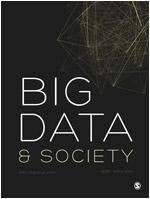
Big Data & Society
Unlocking Insights for a Data-Driven SocietyBig Data & Society is a premier open-access journal published by SAGE Publications Inc, first established in 2014 in the United Kingdom. This influential journal has rapidly become a cornerstone in the landscape of big data research, with an impressive impact demonstrated by its Q1 ranking across various fields, including Communication, Computer Science Applications, Information Systems, and Library and Information Sciences. With its focus on the critical intersections between data analytics and societal implications, Big Data & Society serves as an essential platform for scholars, professionals, and students to disseminate cutting-edge research and foster discussion in these dynamic and impactful domains. Researchers benefit from its rigorous peer-review process and robust visibility, as evidenced by Scopus rankings placing it in the top percentiles across multiple categories. By upholding open-access principles, the journal ensures that scholarly work is readily available, facilitating broader engagement and knowledge transfer within the academic community and beyond.
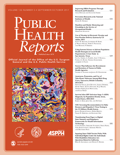
PUBLIC HEALTH REPORTS
Bridging gaps in public health knowledge.PUBLIC HEALTH REPORTS is a premier journal in the field of public health, published by SAGE PUBLICATIONS INC in the United States. With its ISSN 0033-3549 and E-ISSN 1468-2877, this esteemed publication has been an influential voice in the discipline since its inception in 1945. Recognized for its rigorous scholarship, it currently holds a distinguished Q1 ranking in the 2023 category of Public Health, Environmental and Occupational Health, emphasizing its significance with a Scopus rank of #186 out of 665, placing it in the 72nd percentile. The journal aims to disseminate high-quality research that addresses pressing health issues and promotes evidence-based practices, making it a vital resource for researchers, professionals, and students alike. Although it is not an open-access journal, PUBLIC HEALTH REPORTS continues to offer extensive insights and advancements pertinent to the global public health landscape, thereby fostering a deeper understanding and engagement with critical health determinants. Researchers and health practitioners are encouraged to contribute to this dynamic forum where knowledge and innovation converge.
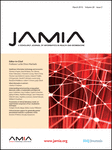
JOURNAL OF THE AMERICAN MEDICAL INFORMATICS ASSOCIATION
Transforming Healthcare with Cutting-Edge Informatics InsightsThe Journal of the American Medical Informatics Association, published by Oxford University Press, stands as a premier publication within the field of Health Informatics, showcasing cutting-edge research and innovative practices. With an impressive Q1 category ranking in 2023 and a remarkable Scopus rank of #6 out of 138, this journal consistently contributes to the advancement of knowledge and application in medical informatics, making it a vital resource for researchers, healthcare professionals, and students alike. Since its inception in 1994, the journal has fostered interdisciplinary collaboration and provides a platform for high-quality research that drives improvements in healthcare practices and technology. Although it operates on a subscription model, the journal's impactful findings and comprehensive analyses are essential for those looking to stay at the forefront of health informatics innovations.

Annee du Maghreb
Illuminating the Historical Contexts of the MaghrebAnnée du Maghreb, published by CNRS Éditions, is an esteemed open-access journal dedicated to advancing the study of Mediterranean and North African cultures, history, and societies. Since its inception in 2004, the journal has aimed to foster a deeper understanding of the complex socio-political dynamics, artistic expressions, and historical contexts of the Maghreb region. By providing a platform for rigorous research and interdisciplinary dialogue, Année du Maghreb plays a pivotal role in enriching academic discourse and enhancing knowledge within the fields of anthropology, history, and cultural studies. Accessible to a global audience, this journal invites researchers, professionals, and students to contribute to its growing repository of scholarly work, ensuring the continuation of high-quality discussions pertinent to this vibrant area of study.
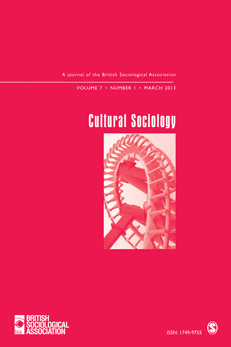
Cultural Sociology
Fostering Dialogue Across Cultural DisciplinesCultural Sociology is a leading academic journal published by SAGE Publications Ltd, aimed at advancing the field of cultural studies and social sciences. Established in 2007 and converging until 2024, this UK-based journal boasts a remarkable Q1 ranking in both Cultural Studies and Miscellaneous Social Sciences as of 2023, solidifying its reputation as a significant contributor to scholarly discourse. With a Scopus rank of #83 out of 1304 in its primary field, Cultural Sociology offers an important platform for researchers, professionals, and students to explore the intricate relationships between culture, society, and identity. Although it is not currently Open Access, this journal is dedicated to fostering interdisciplinary dialogue and rigorous research, making it an essential resource for those seeking to engage deeply with cultural phenomena and social dynamics.

Body & Society
Innovative Insights into the Body's Role in Cultural DynamicsBody & Society is a premier journal published by SAGE Publications Ltd, specializing in the interconnections between the human body and societal structures across diverse contexts. Established in 1995, this influential journal has carved a niche in the fields of Cultural Studies, Health (social science), and Social Psychology, ranking in the top quartiles for 2023 with a Q1 designation in Cultural Studies. It provides a platform for interdisciplinary research that explores how bodily experiences influence, and are influenced by, cultural and societal norms. With an emphasis on innovative perspectives and critical analyses, Body & Society aims to foster a deeper understanding of the complexities surrounding physicality in a social context. Although open access is not currently available, the journal’s rigorous peer-review process guarantees high-quality dissemination of scholarly work for the enrichment of academia and its related fields. Researchers, professionals, and students alike will find valuable insights and a stimulating environment to engage with contemporary issues related to the human body within society.
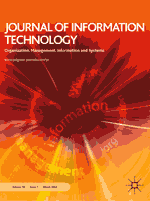
JOURNAL OF INFORMATION TECHNOLOGY
Advancing Knowledge in Information Systems and ManagementJOURNAL OF INFORMATION TECHNOLOGY, published by SAGE PUBLICATIONS LTD, stands as a leading academic periodical in the realm of Information Systems, Library and Information Sciences, and Strategy and Management. With an impressive impact factor reflected in its recognition as a Q1 journal in multiple categories, it serves as a pivotal resource for researchers and practitioners aiming to deepen their understanding of IT's role in contemporary society. Operating from the United Kingdom, this journal has been a beacon of innovative research since its inception in 1987 and will continue to provide valuable insights through 2024 and beyond. Despite its traditional publishing model, the journal offers opportunities for authors to contribute significant findings that challenge prevailing paradigms and shape future inquiries in the technological landscape. Recognized in Scopus as a premier outlet with top percentile ranks in its fields, the JOURNAL OF INFORMATION TECHNOLOGY is essential for anyone engaged in the dynamic intersection of technology and information management.